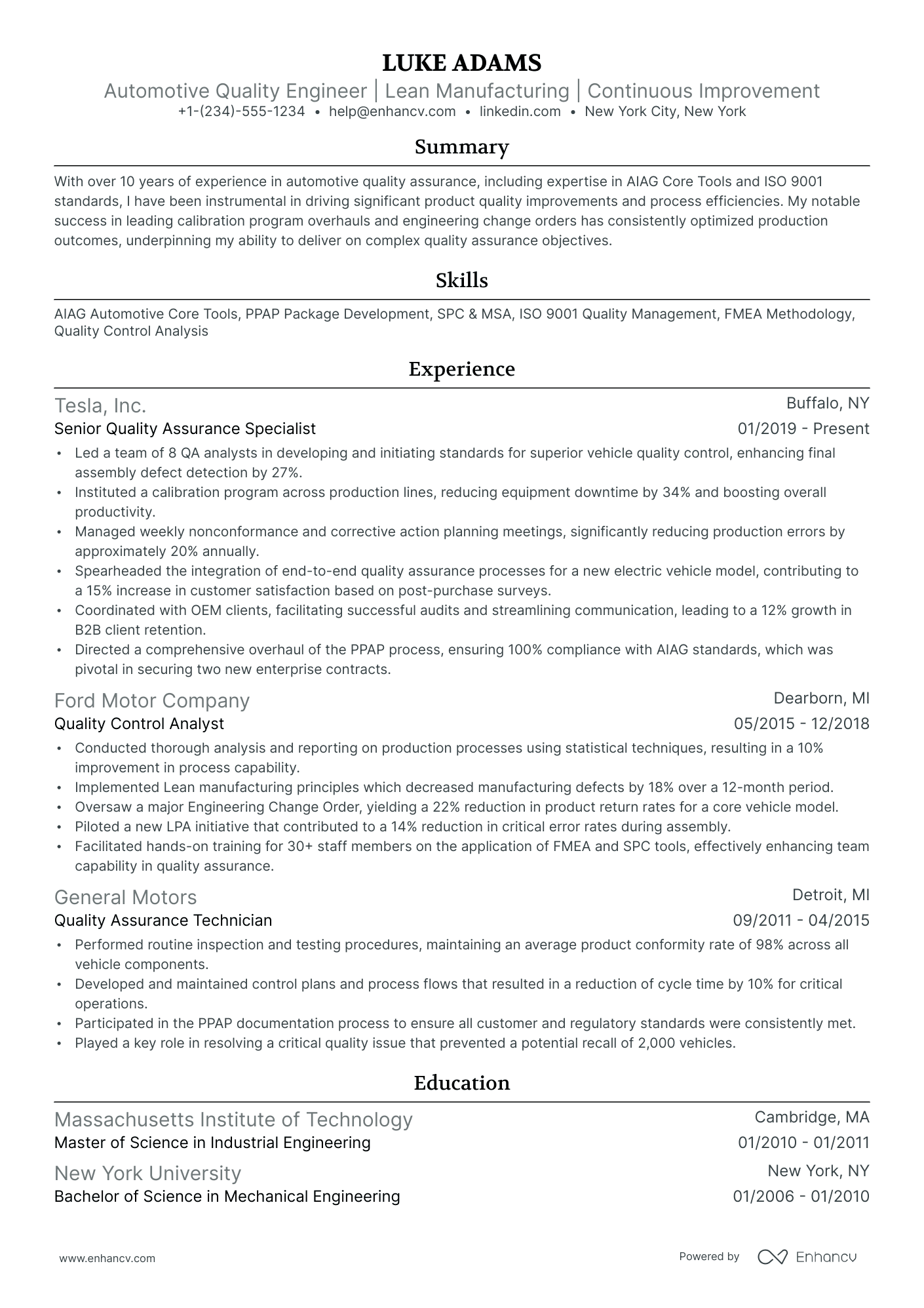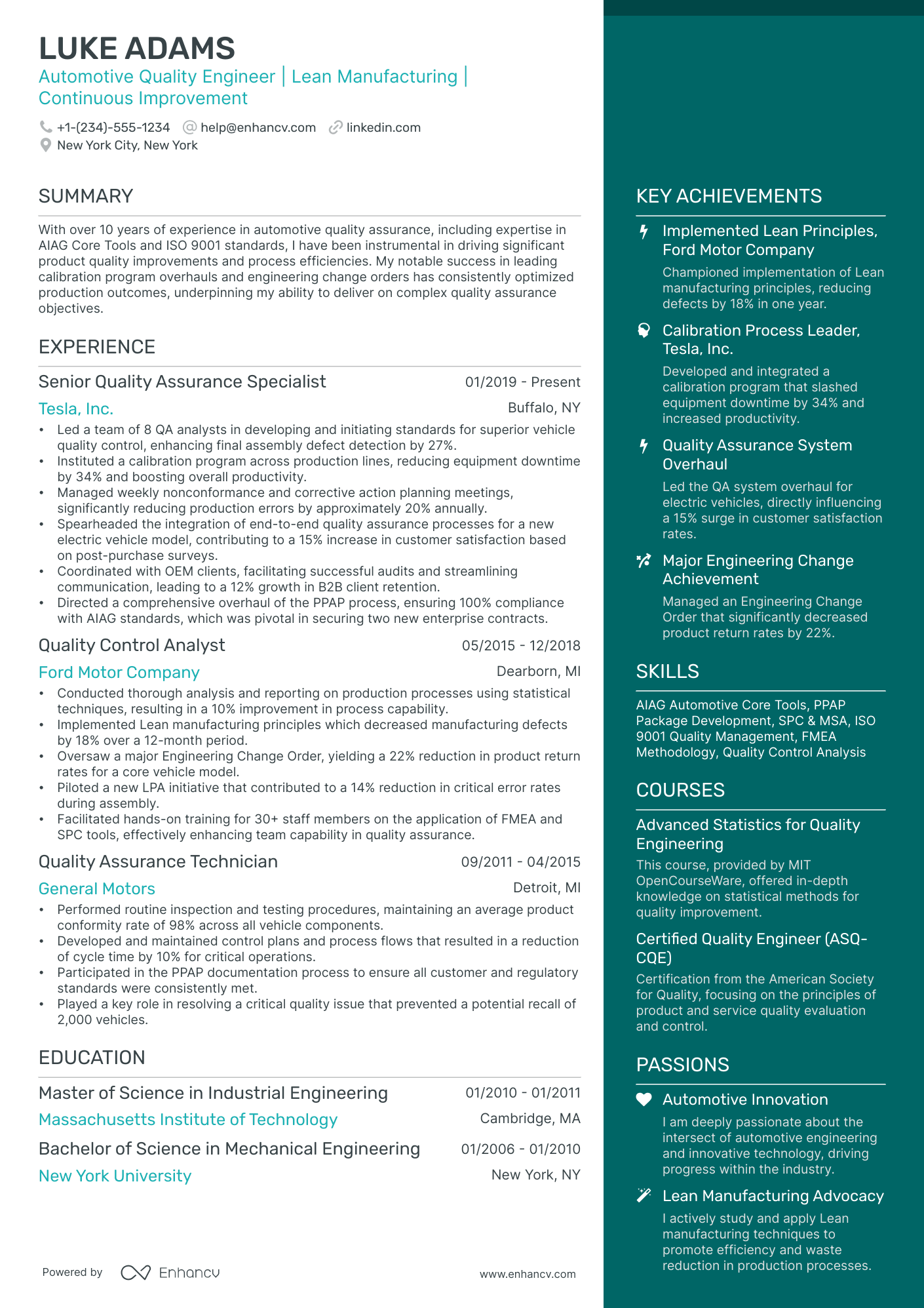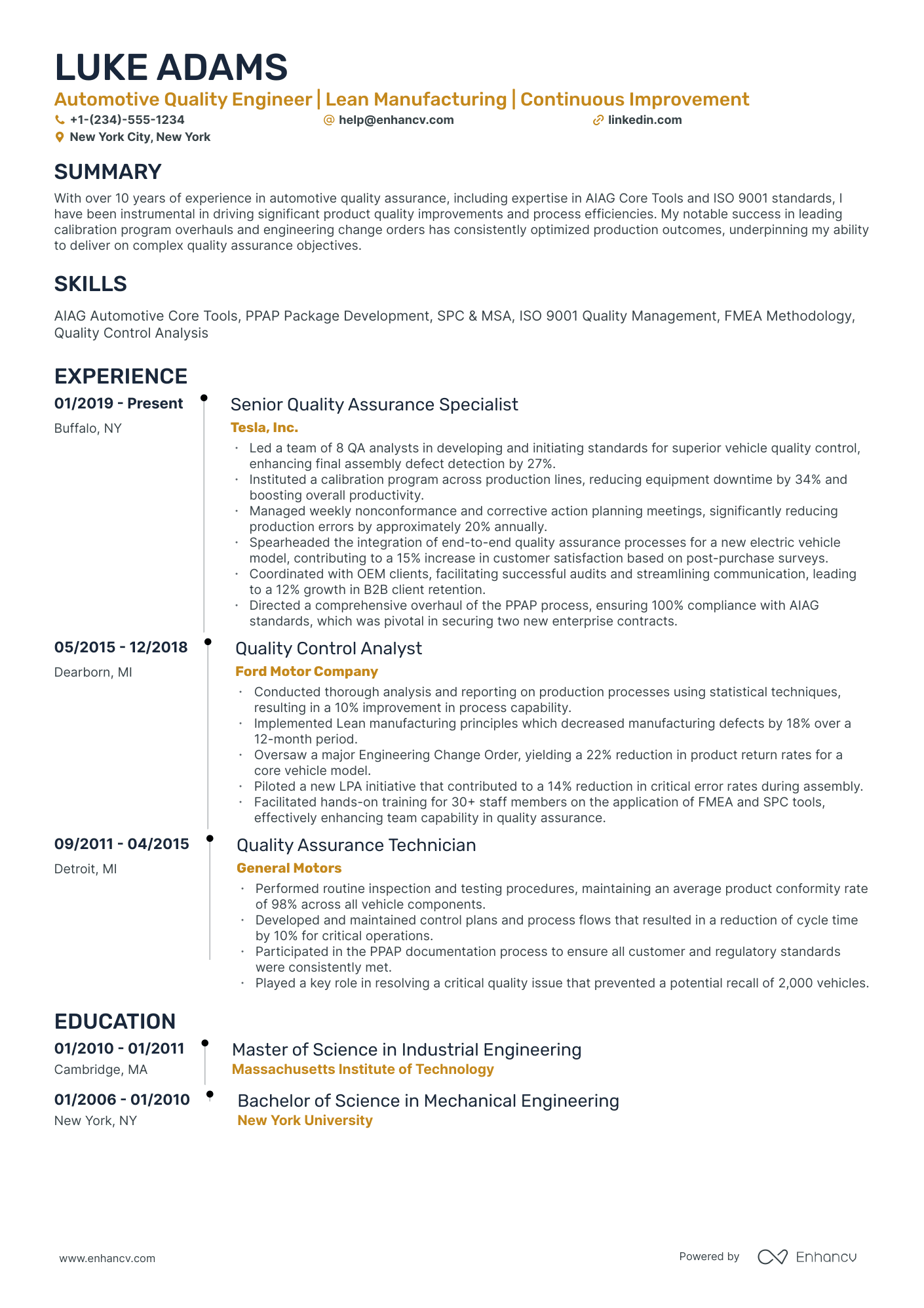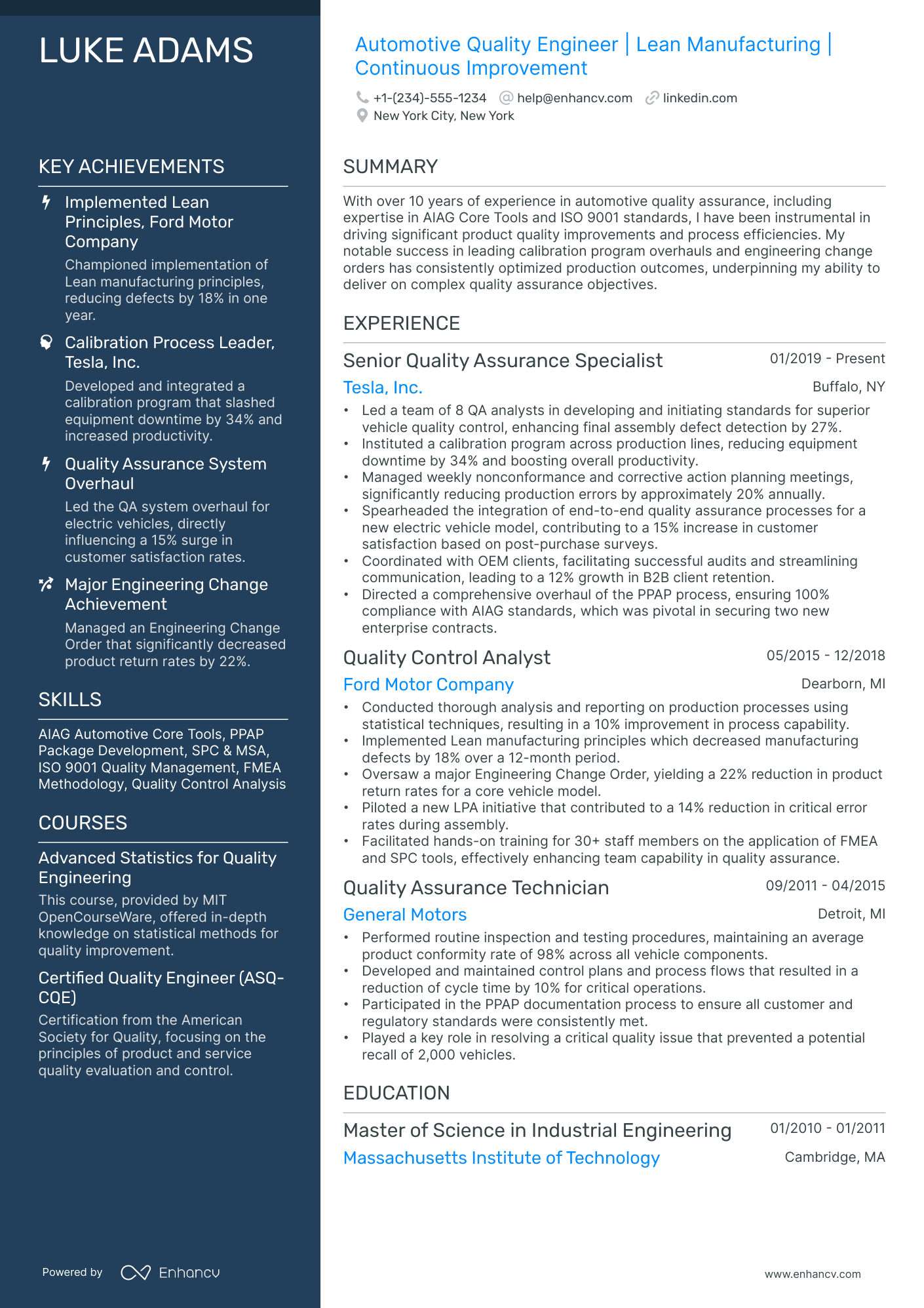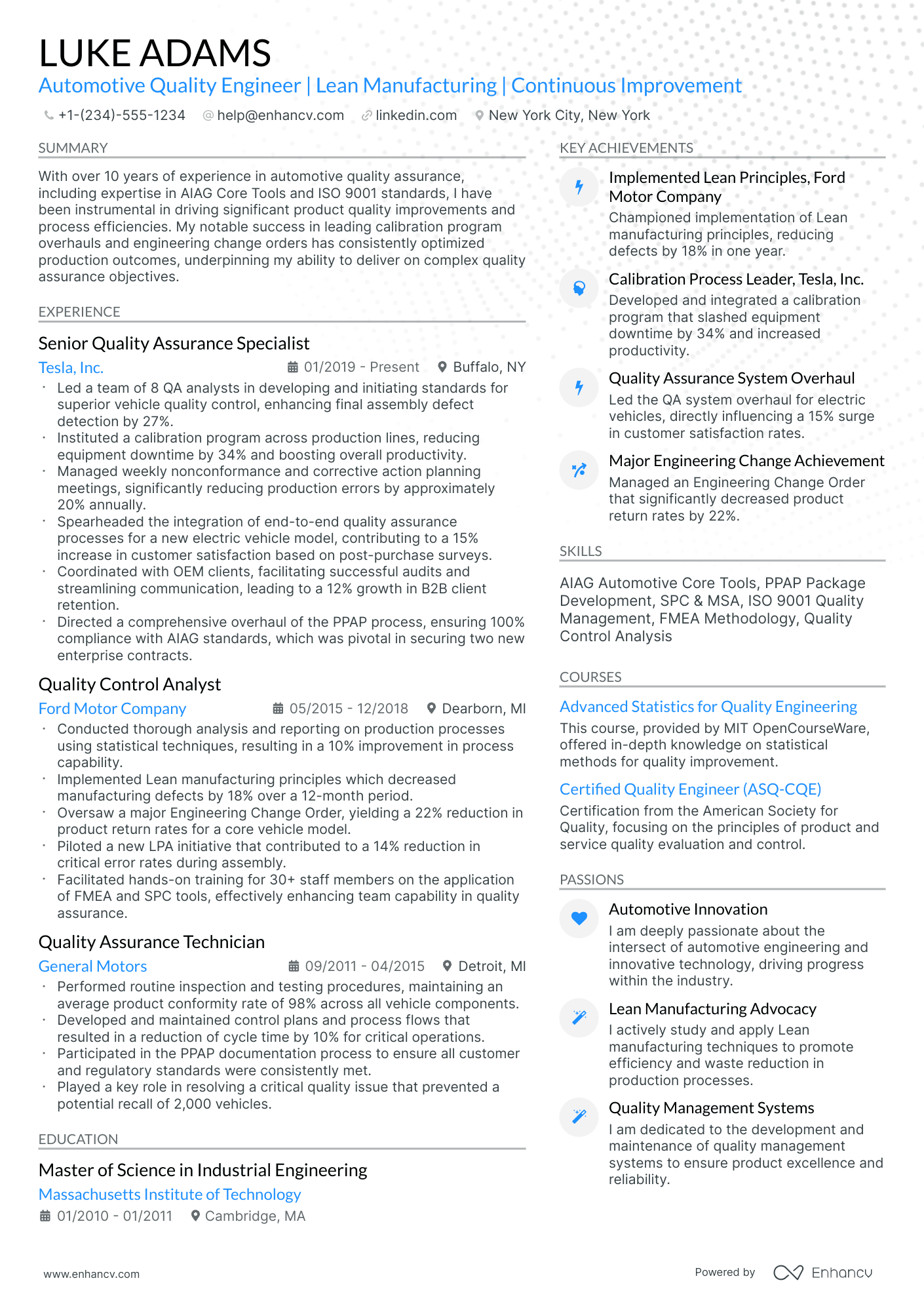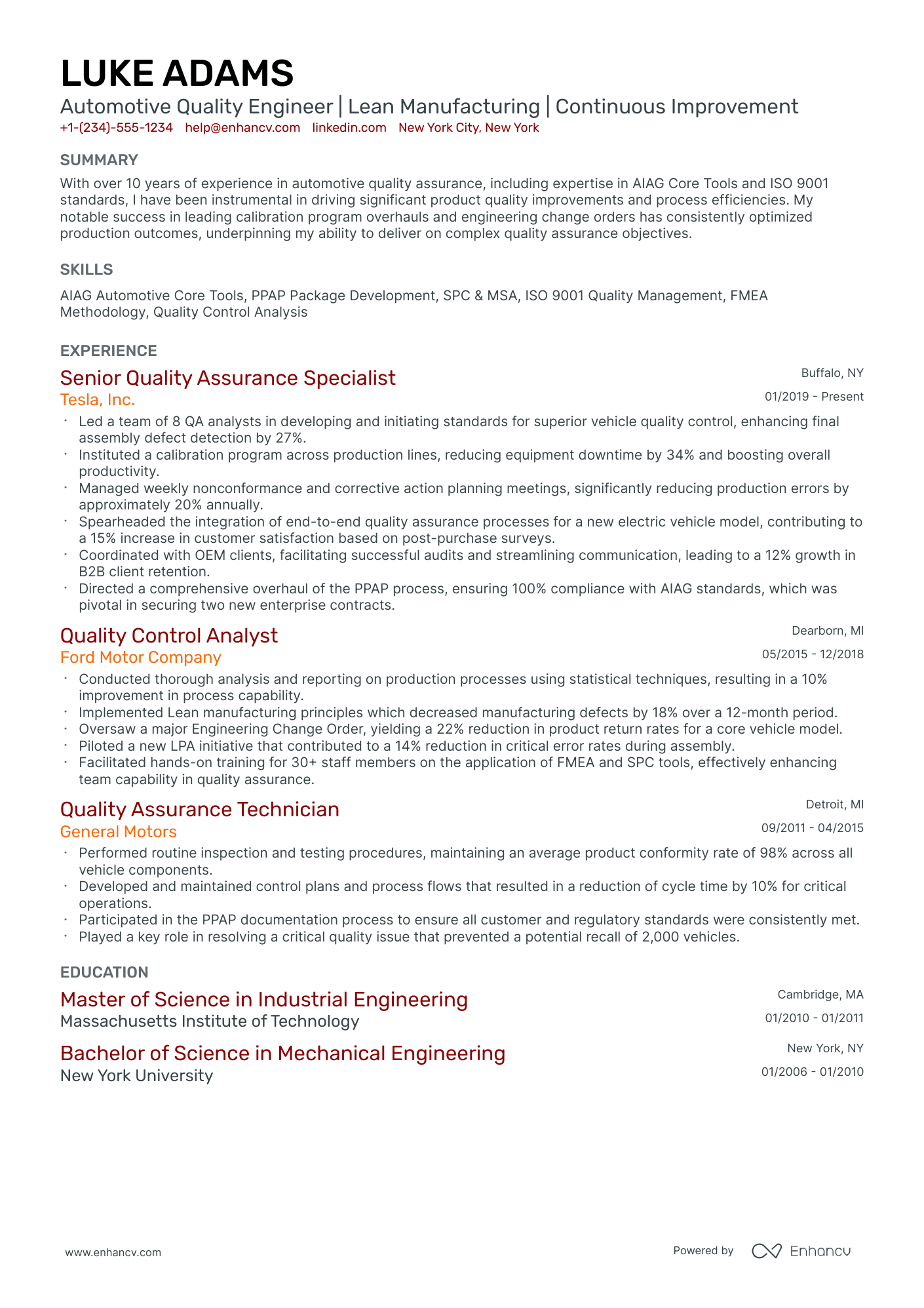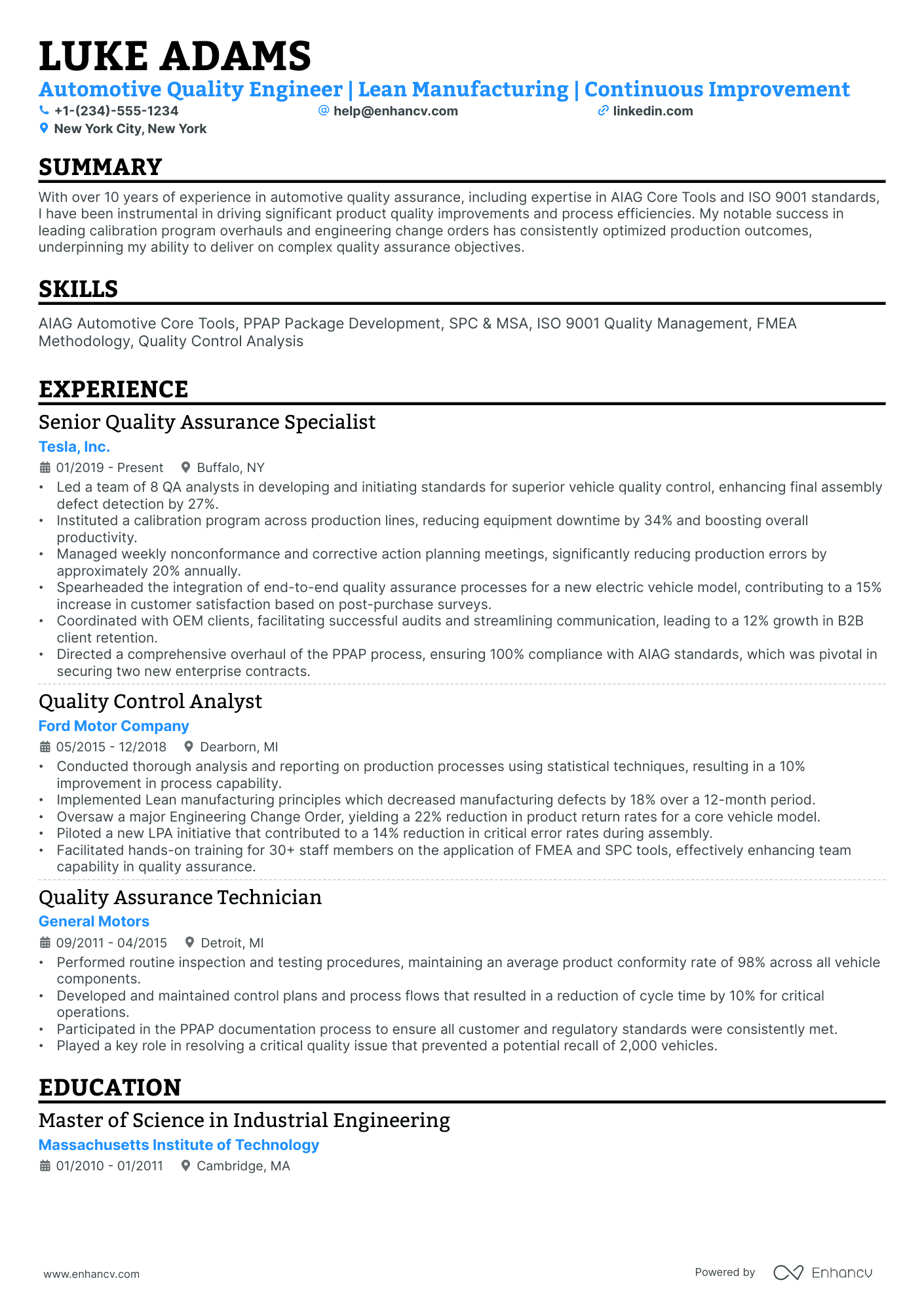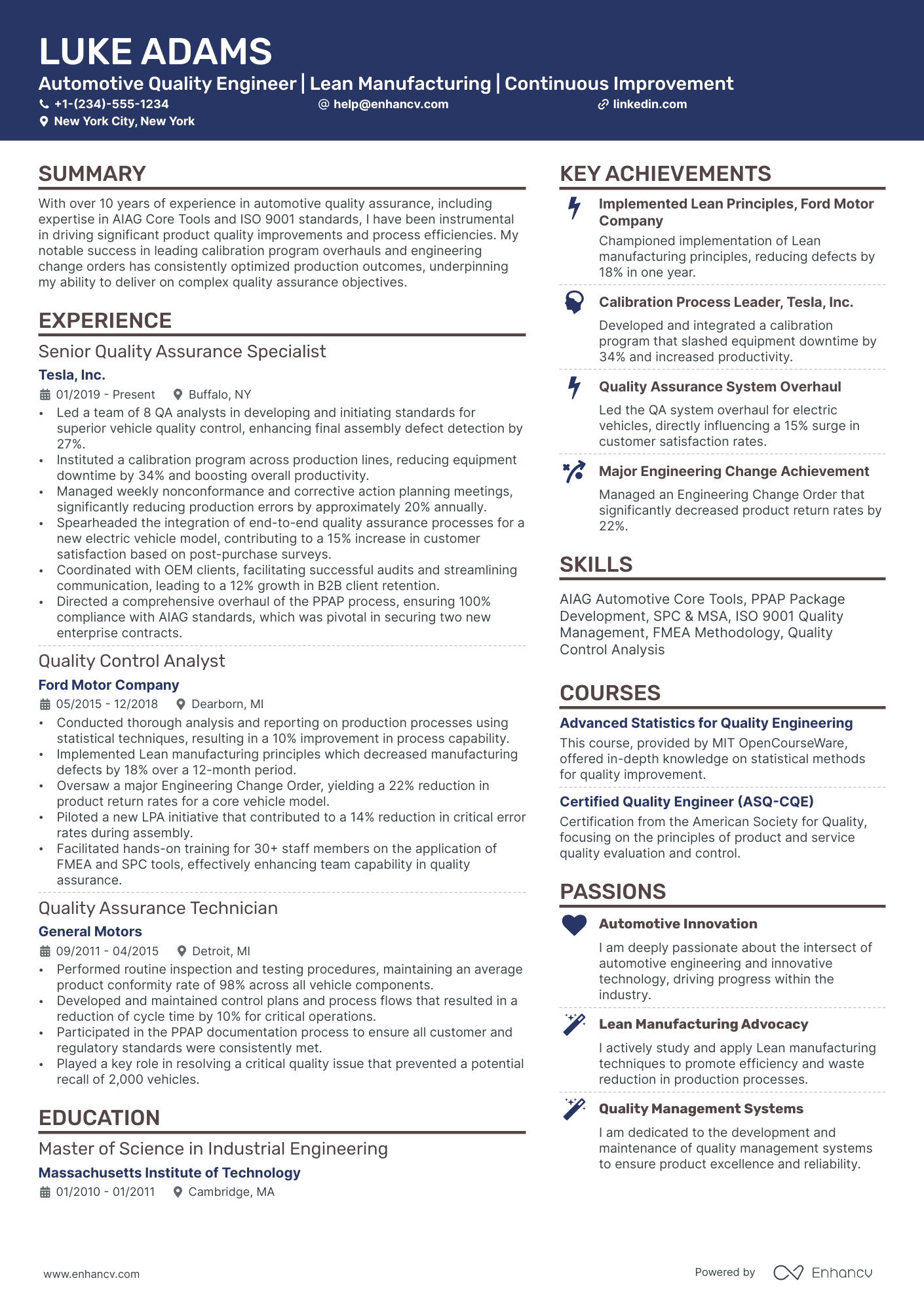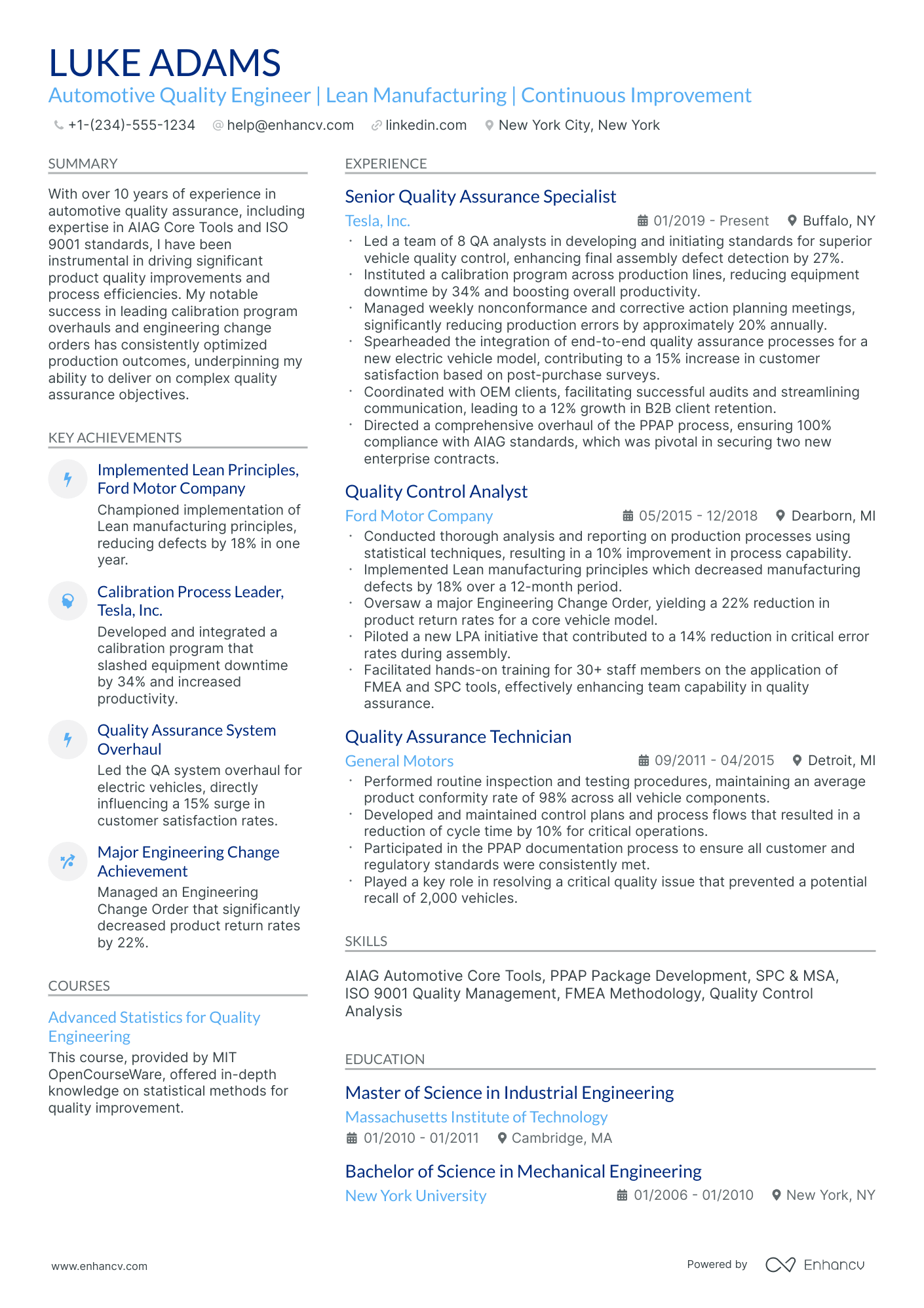As an automotive engineer, articulating the depth of your technical expertise and project experience in a concise resume can be a significant challenge. Our guide provides targeted strategies and examples to help you effectively showcase your skills and achievements, ensuring your resume stands out to potential employers.
- Sample industry-leading examples to learn how to write your best resume yet.
- Improve the experience, education, and achievements section of your resume with insights from resume-writing professionals.
- Curate your technical expertise and personality to stand out amongst the pool of candidates.
- Succinctly focus on your unique skill set all through your automotive engineering resume.
If the automotive engineering resume isn't the right one for you, take a look at other related guides we have:
- Construction Superintendent Resume Example
- Landscape Architect Resume Example
- Engineering Project Manager Resume Example
- Energy Manager Resume Example
- Electrical Manager Resume Example
- Petroleum Engineer Resume Example
- Electrical Project Manager Resume Example
- Director of Engineering Resume Example
- Architectural Project Manager Resume Example
- Construction Worker Resume Example
Tips and tricks for your automotive engineering resume format
Before you start writing your resume, you must first consider its look-and-feel - or resume format . Your professional presentation hence should:
- Follow the reverse-chronological resume format , which incroporates the simple logic of listing your latest experience items first. The reverse-chronological format is the perfect choice for candidates who have plenty of relevant (and recent) experience.
- State your intention from the get-go with a clear and concise headline - making it easy for recruiters to allocate your contact details, check out your portfolio, or discover your latest job title.
- Be precise and simple - your resume should be no more than two pages long, representing your experience and skills that are applicable to the automotive engineering job.
- Ensure your layout is intact by submitting it as a PDF. Thus, your resume sections would stay in place, even when assessed by the Applicant Tracker System (ATS).
Remember, resume layouts can vary by country – for example, a Canadian resume format could look different.
Upload & Check Your Resume
Drop your resume here or choose a file. PDF & DOCX only. Max 2MB file size.
PRO TIP
List all your relevant higher education degrees within your resume in reverse chronological order (starting with the latest). There are cases when your PhD in a particular field could help you stand apart from other candidates.
The key to your automotive engineering job-winning resume - present your expertise with these sections:
- A header to make your resume more scannable
- Snapshot of who you are as a professional with your resume soft skills, achievements, and summary or objective
- Job advert keywords in the skills section of your resume
- Resume experience quantifying your past job successes with metrics
- A relevant education, certification, and technical sills section to provide background to your technological/software capabilities
What recruiters want to see on your resume:
- Experience with CAD software such as SolidWorks, CATIA, or AutoCAD for vehicle design and component modeling.
- Knowledge of automotive systems and components such as powertrain, suspension, brakes, steering, and HVAC.
- Understanding of vehicle dynamics and control systems, including experience with simulation tools like MATLAB/Simulink or CarSim.
- Familiarity with automotive industry standards and regulations such as SAE, ISO, and EPA compliance.
- Hands-on experience with vehicle testing, data acquisition, and analysis to improve performance and safety.
Five dos for building your automotive engineering resume experience section
The best strategic approach to your automotive engineering resume experience section is to support your particular responsibilities with actions and achievements.
For example, you could list:
- Up to six responsibilities in your day-to-day work, supported by why they're important for your role, department, or organization;
- Experience items that have helped you sustain and enhance your technical knowledge within the field, or, perhaps, have helped you grow as a professional;
- Any metrics that pinpoint your success within your past roles;
- How you've solved specific problems in your day-to-day work;
- Strategies and solutions you've implemented for growth - and how that growth was measured.
The automotive engineering resume experience is your best shot at making a good first impression on recruiters. That's why we've included some real-world professional examples to get you thinking about how you present your experience:
- Led a team of 10 engineers in the development of a new fuel injection system, increasing engine efficiency by 15%.
- Spearheaded the implementation of cutting-edge lightweight materials, reducing overall vehicle weight by 10% and improving fuel economy.
- Collaborated with cross-functional teams on the design of a hybrid electric vehicle, which improved the model's market share by 20%.
- Orchestrated the integration of advanced driver-assistance systems, enhancing vehicle safety ratings and surpassing competitor offerings.
- Managed the overhaul of the production process, adopting lean manufacturing principles and reducing lead times by 25%.
- Directed the successful redesign of a flagship SUV model, contributing to a 30% increase in year-over-year sales.
- Implemented new engine tuning techniques, which improved power output by 20% without compromising emissions standards.
- Facilitated the adoption of virtual reality technology for prototype evaluations, reducing the design to production time by five months.
- Played a pivotal role in establishing a partnership with a leading battery manufacturer, leading to the creation of a more efficient electric powertrain.
- Innovated a proprietary software for vehicle dynamics simulation, which is now used company-wide, achieving a 40% reduction in physical prototyping costs.
- Coordinated with international teams for global platform development, which facilitated the entry into new markets increasing the business reach by 25%.
- Championed the adoption of 3D printing for component prototyping, drastically accelerating iteration cycles and improving component precision.
- Pioneered the application of machine learning algorithms for predictive maintenance, reducing vehicle downtime by 30% and saving millions in operational costs.
- Managed and executed a project to comply with Euro 6 emissions standards, ensuring all new models met stringent environmental regulations.
- Developed and implemented an innovative aerodynamics package for a sports car model, contributing to a 10% improvement in lap times on test tracks.
- Enhanced automotive HVAC systems by integrating new filtration technology, leading to a 50% increase in air quality inside vehicles.
- Hosted workshops to improve inter-departmental communication, resulting in a 35% shorter development cycle for new vehicle platforms.
- Launched a company-wide initiative to upgrade to the latest CAD software, significantly improving design accuracy and reducing revision cycles.
- Directed the transition to using sustainable materials in vehicle interiors, positioning the brand as a leader in environmental responsibility in the automotive sector.
- Optimized vehicle acoustic performance by developing an innovative noise-cancellation system, enhancing passenger comfort and brand reputation.
- Managed the end-to-end process of a limited-edition sports car production, overseeing the successful delivery of all 500 units priced at a premium, reflecting high customer satisfaction and brand exclusivity.
- Delivered a company-first all-wheel-drive system for a high-performance vehicle, boosting traction by 30% and achieving record sales.
- Executed meticulous Vehicle Dynamics assessments that led to a 20% enhancement in cornering performance for the main sedan line.
- Negotiated and secured a multi-million dollar contract with a tier-1 supplier for the provision of advanced driver-assistance systems across all models.
Quantifying impact on your resume
- Include the number of design projects you led or contributed to, showcasing project management skills.
- List the percentage of cost reduction achieved through re-engineering or process optimization.
- Mention the exact number of patents you hold in automotive engineering technologies.
- Quantify the improvement in vehicle performance or efficiency you achieved in specific metrics (e.g., horsepower, fuel economy).
- Specify the size of the teams you have managed or collaborated with on cross-functional projects.
- State the amount of time and resources saved through streamlined testing procedures or innovations.
- Detail the volume of production or manufacturing processes you've overseen or improved.
- Report the number of technical reports or analyses you have authored and their influence on decision-making.
Action verbs for your automotive engineering resume
Lacking relevant automotive engineering resume experience?
Learn how to write your automotive engineering resume experience in spite of having no real-world (or applicable) experience for the job.
You should:
- Feature relevant projects or publications that could impress recruiters or showcase that you have the basic skill set for the job
- Shift the focus towards your people (communication, organization, etc.) skills to demonstrate that you're a quick learner and can easily adapt to a new environment
- Use the resume objective to not only highlight your accomplishments but also map out how your career plans are perfectly aligned with the company's vision
- Select either the functional-skill-based resume format (that puts the focus on your skills) or the hybrid one (balancing expertise with skills).
Recommended reads:
PRO TIP
Highlight any significant extracurricular activities that demonstrate valuable skills or leadership.
Key hard skills and soft skills for your automotive engineering resume
At the top of any recruiter automotive engineering checklist, you'd discover a list of technical competencies, balanced with personal skills.
Hard or technical skills are your opportunity to show how you meet the essential responsibilities of the role. The ability to use a particular job-crucial technology or software would also hint to recruiters whether you'd need a prolonged period of on-the-job training - or you'd fit right in the job.
But to land your dream role, you'd also need to demonstrate a variety of soft or people resume skills . Employers care about soft skills as they show how each candidate would fit into the team and company culture.
Both types of skills are specific and to best curate them on your resume, you'd need to:
- Create a skill section within which you showcase your hard and soft skills and present how they help you succeed.
- List specific examples of projects, tasks, or competitions, within which your skill set has assisted your results.
- Soft skills are harder to measure, so think about situations in which they've helped you thrive. Describe those situations concisely, focusing on how the outcome has helped you grow as a professional.
- Metrics of success - like positive ROI or optimized workplace processes - are the best way to prove your technical and people skills.
Take a look at some of automotive engineering industry leaders' favorite hard skills and soft skills, as listed on their resumes.
Top skills for your automotive engineering resume:
CAD Software (e.g., CATIA, SolidWorks)
Finite Element Analysis (FEA)
Computer-Aided Engineering (CAE)
Automotive Control Systems
Engine Design and Development
Vehicle Dynamics Simulation
Embedded Systems Programming
Automotive Safety Standards (e.g., ISO 26262)
Manufacturing Processes and Techniques
Electrification and Hybrid Technologies
Problem-Solving
Team Collaboration
Project Management
Communication Skills
Critical Thinking
Time Management
Attention to Detail
Adaptability
Creativity
Leadership
PRO TIP
If you failed to obtain one of the certificates, as listed in the requirements, but decide to include it on your resume, make sure to include a note somewhere that you have the "relevant training, but are planning to re-take the exams". Support this statement with the actual date you're planning to be re-examined. Always be honest on your resume.
What are the best certificates to add to your automotive engineering resume + how to curate your education section
The education and certification resume sections are the underdogs of your automotive engineering resume.
They showcase to recruiters that you've invested plenty of time to gain valuable and specific know-how, vital for growth.
As far as the resume education section is concerned:
- Detail only advanced education, specifying the institution and timeframe.
- Indicate your forthcoming graduation date if you're in the midst of your studies.
- Consider omitting degrees that don't align with the job's requirements.
- Offer a description of your academic journey if it underscores your notable achievements.
When curating your degrees and certificates on your automotive engineering resume:
- Select only accreditation that matters to the role
- Niche knowledge that could help you stand out as a candidate (as is within the past few years), should be listed towards the top of your resume
- Include any pertinent data for credibility (e.g. institute name, graduation dates, etc.)
- Irrelevant degrees and certifications shouldn't make it on your resume. Those include your high school diploma and any specializations that have nothing to do with the technical or soft skills that are required for the job
As a final note, if you feel tempted to exclude your education or certification from your resume, don't.
These two sections could help you have a better competitive edge over other candidates - hinting that your professional journey in the industry may be for a longer period of time.
Recruiters find all of these automotive engineering credentials impressive:
The top 5 certifications for your automotive engineering resume:
- Certified Automotive Engineer (CAE) - Society of Automotive Engineers (SAE)
- Automotive Service Excellence (ASE) Certification - National Institute for Automotive Service Excellence
- Professional Engineer (PE) License - National Council of Examiners for Engineering and Surveying (NCEES)
- Certified Quality Engineer (CQE) - American Society for Quality (ASQ)
- Project Management Professional (PMP) - Project Management Institute (PMI)
PRO TIP
Showcase any ongoing or recent educational efforts to stay updated in your field.
Recommended reads:
Which one to use: a resume summary or a resume objective?
The automotive engineering resume summary or objective serves as a good introduction to your experience for recruiters.
Have you ever wondered which one (the summary or objective) will be more appropriate for your automotive engineering resume?
- If you are a less experienced professional, write a resume objective statement. The objective is about three sentences long and provides recruiters with information about your career goals, strengths, and achievements . It should basically denote how you see yourself in this particular role, and what is your relevant experience and/or know-how;
- If you happen to have plenty of relevant experience, select your most impressive achievements for your resume summary. The summary is no longer than five sentences and serves as a storytelling instrument - highlighting your greatest career wins . Don't forget to align your summary with the job requirements to ensure your resume stays relevant to the role.
Read on for more information and examples of resume summaries and objectives from real world professionals.
Resume summaries for a automotive engineering job
- Seasoned automotive engineer with 10 years of experience specializing in the design and optimization of internal combustion engines. Known for driving the integration of advanced hybrid technologies in flagship vehicles, leading to a 15% increase in fuel efficiency and a prestigious industry award for innovation.
- Dynamic professional with a proven track record in mechanical engineering, seeking to leverage 8 years of experience into the automotive industry. Key achievements include patenting a novel cooling system and significantly improving the performance of industrial machinery, underscoring a keen aptitude for vehicular thermodynamics and systems integration.
- Recent mechanical engineering graduate with a fervent interest in automotive design, eager to apply theoretical knowledge and fresh perspective to developing cutting-edge vehicle systems. With hands-on experience in 3D modeling and a senior project focused on aerodynamics, ready to make a tangible impact in automotive innovation.
- Ambitious chemical engineer aiming to transition into automotive engineering, bringing 7 years of experience in material science and an exemplary record of developing high-performance polymers. Recognized for contributing to a 20% increase in product lifespan, prepared to apply expertise to enhance automotive composite materials.
- Aspiring automotive professional with a passion for eco-friendly technology and zero experience in the field, highly motivated to contribute to sustainable vehicle design. Holds a Master's degree in Environmental Science and possesses strong analytical skills, aiming to integrate green principles in automotive engineering practices.
- Electrical engineer with 5 years of experience in power systems, looking to pivot into automotive engineering with a deep interest in electric vehicle technology. Boasts a successful project that led to a 30% improvement in energy distribution efficiency, eager to employ innovative electrical solutions in the development of efficient and reliable electric cars.
Optimize your resume summary and objective for ATS
Drop your resume here or choose a file.
PDF & DOCX only. Max 2MB file size.
More relevant sections for your automotive engineering resume
Perhaps you feel that your current resume could make use of a few more details that could put your expertise and personality in the spotlight.
We recommend you add some of these sections for a memorable first impression on recruiters:
- Projects - you could also feature noteworthy ones you've done in your free time;
- Awards - showcasing the impact and recognition your work has across the industry;
- Volunteering - the social causes you care the most about and the soft skills they've helped you sustain and grow;
- Personality resume section - hobbies, interests, favorite quote/books, etc. could help recruiters gain an even better understanding of who you are.
Key takeaways
At the end of our guide, we'd like to remind you to:
- Invest in a simple, modern resume design that is ATS friendly and keeps your experience organized and legible;
- Avoid just listing your responsibilities in your experience section, but rather focus on quantifiable achievements;
- Always select resume sections that are relevant to the role and can answer job requirements. Sometimes your volunteering experience could bring more value than irrelevant work experience;
- Balance your technical background with your personality traits across various sections of your resume to hint at how much time employers would have to invest in training you and if your profile would be a good cultural fit to the organization;
- Include your academic background (in the form of your relevant higher education degrees and certifications) to show recruiters that you have the technical basics of the industry covered.
